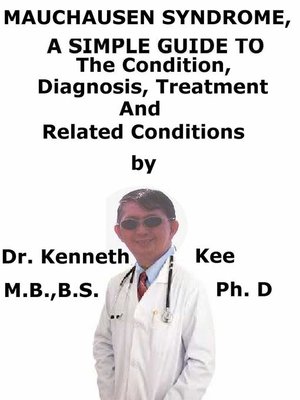Munchausen Syndrome, a Simple Guide to the Condition, Diagnosis, Treatment and Related Conditions
ebook
By Kenneth Kee

Sign up to save your library
With an OverDrive account, you can save your favorite libraries for at-a-glance information about availability. Find out more about OverDrive accounts.
Find this title in Libby, the library reading app by OverDrive.



Search for a digital library with this title
Title found at these libraries:
| Library Name | Distance |
|---|---|
| Loading... |
This book describes Munchausen Syndrome, Diagnosis and Treatment and Related Diseases
Munchausen syndrome is a mental illness featured by three signs:
1. Simulated illness: either physical or psychiatric.
2. Pathological lying (pseudologia fantastica).
3. Wandering from place to place (peregrination): the patient normally presents to numerous different hospitals, using different names.
In Munchausen syndrome:
1. Symptoms can be simulated - e.g., contamination of specimens to look like hematuria, hemoptysis, hematemesis.
2. A pre-existing illness can be exaggerated.
3. Disease may even be self-induced - e.g., eating contaminated food to cause food poisoning.
People with Munchausen syndrome may go through unnecessary tests, operations, or uncomfortable investigations and procedures.
They can cause themselves considerable injury.
Costs sustained to health services for these repeated admissions and procedures can be huge.
There is a related disorder known as Munchausen syndrome by proxy in which a parent or caregiver produces factitious illness in a child or adult in their care.
The caregiver of a child, most often a mother, either creates fake symptoms or produces real symptoms to make it look like the child is sick.
Causes
No one knows what causes Munchausen syndrome
The patients:
1. Have suffered abuse or neglect as a child.
The hospital is seen as a safe environment or a way to escape from everyday life.
2. Be trying to understand or cope with earlier serious illness by reliving the experience.
3. Be identifying with someone close who had a serious illness.
4. Have a very low self-image.
5. Have an inability to trust authority figures, such as doctors.
Symptoms
1. Feigning surgical illness and hoping for a laparotomy
2. Bleeding shockingly
3. Presenting with curious fits
4. Presenting with false heart attacks
5. Consuming drugs to produce side-effects - e.g., beta-blockers to induce bradycardia, desmopressin to induce hyponatremia, insulin to induce hypoglycemia.
6. Wounds may not recover properly because of contamination
7. Gastrointestinal disorders such as vomiting, diarrhea.
8. Respiratory disorders often with breathlessness and hyperventilation.
9. Self-mutilation causing extensive scarring
10. Malnutrition and anemia
Diagnosis:
Patients may interfere with samples such as putting blood in urine.
They may also interfere with their charts.
They may ingest or inject themselves with toxic substances to produce abnormality
The doctor should be alert to inconsistencies in the history and symptoms and signs that do not seem to fit.
Treatment
When the diagnosis is made it is essential to strike a balance between exclusion of severe disease and providing the pathological needs.
When the diagnosis seems sure, the patient should be confronted in a sympathetic way.
They may also become hostile and aggressive if confronted.
The psychiatric treatment may be useful but often patients discharge themselves from hospital once their present disorder has obtained attention or they alter the doctors if confronted in primary care
No medicine has been found to make a significant difference to the behavior of Munchausen syndrome patients.
The danger is that the patient may be deprived of a true need when they have organic illness.
When a patient with Munchausen syndrome is recognized, hospitals may keep a record of this in a Munchausen's file.
The formation of a universal electronic care record system would significantly help in the recognition of...







